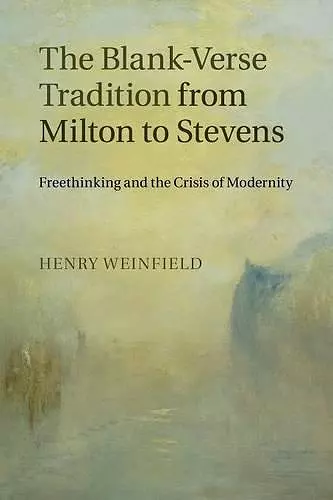The Blank-Verse Tradition from Milton to Stevens
Freethinking and the Crisis of Modernity
Format:Paperback
Publisher:Cambridge University Press
Published:26th Mar '15
Currently unavailable, and unfortunately no date known when it will be back

A detailed study of Milton, Wordsworth, Shelley, Keats, Tennyson and Stevens, tracing what lies behind their choice of blank verse.
Blank verse has been central to English poetry since the Renaissance, most famously in Shakespeare's plays and in Paradise Lost. Henry Weinfield's detailed readings of the masterpieces of English blank verse focus on Milton, Wordsworth, Shelley, Keats, Tennyson and Stevens, tracing what lies behind their choice of form.Blank verse, unrhymed iambic pentameter, has been central to English poetry since the Renaissance. It is the basic vehicle of Shakespeare's plays and the form in which Milton chose to write Paradise Lost. Milton associated it with freedom, and the Romantics, connecting it in turn with freethinking, used it to explore change and confront modernity, sometimes in unexpectedly radical ways. Henry Weinfield's detailed readings of the masterpieces of English blank verse focus on Milton, Wordsworth, Shelley, Keats, Tennyson and Stevens. He traces the philosophical and psychological struggles underlying these poets' choice of form and genre, and the extent to which their work is marked, consciously or not, by the influence of other poets. Unusually attuned to echoes between poems, this study sheds new light on how important poetic texts, most of which are central to the literary canon, unfold as works of art.
'The author proposes that blank verse as deployed and championed by Milton in Paradise Lost lends itself to not only freedom but to freethinking (by which he means independence of thought), as evidenced by selected poems by Wordsworth, Keats, Shelley Tennyson and Stevens. The book's strengths lie in much careful explication de texte and in the light shed on many inter-textual linkages.' Archie Burnett, Milton Quarterly
'The very real pleasures of this book are to be found in its resourceful and sensitive readings of very great poems.' Gordon Teskey, Modern Philology
ISBN: 9781107507838
Dimensions: 229mm x 152mm x 14mm
Weight: 360g
266 pages